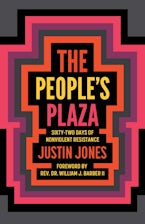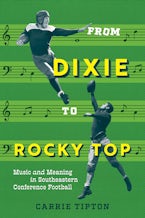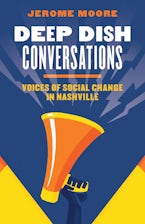- Home
- The People’s Plaza

The People’s Plaza
Sixty-Two Days of Nonviolent Resistance
by Justin Jones
Foreword by William J. Barber II
Central to the occupation was Justin Jones, a student of Fisk University and Vanderbilt Divinity School whose place at the forefront of the protests brought him and the occupation to the attention of the Tennessee state troopers, state and US senators, and Governor Bill Lee. The result was two months of solidarity in the face of rampant abuse, community in the face of state-sponsored terror, and standoff after standoff at the doorsteps of the people's house with those who claimed to represent them. In this, his first book, Jones describes those two revolutionary months of nonviolent resistance against a police state that sought to dehumanize its citizens.
The People's Plaza is a rumination on the abuse of power, and a vision of a more just, equitable, anti-racist Nashville—a vision that kept Jones and those with him posted on the plaza through intense heat, unprovoked arrests, vandalism, theft, and violent suppression. It is a first-person account of hope, a statement of intent, and a blueprint for nonviolent resistance in the American South and elsewhere.
Introduction
Chapter 1: We've Been Here Before
Chapter 2: Lay Your Burdens Down
Chapter 3: "Do Not Underestimate Your Opponent"
Chapter 4: Shift Change
Chapter 5: Power Washing
Chapter 6: "Wait in the Plaza, Children"
Chapter 7: Capitol Hill
Chapter 8: Back the Badge?
Chapter 9: "It Was Like We Were Being Hunted"
Chapter 10: Night Terror
Chapter 11: Aggravated Littering
Chapter 12: State of Tennessee vs. Justin Jones
Conclusion
Timeline
Notes
Justin Jones is an activist, graduate student, and community organizer in Nashville. He came to Fisk University in 2013, where he received the John R. Lewis Scholarship for Social Activism. Inspired by its legacy of the student-led movement for civil rights, Jones became involved on campus and in community groups and spent the past nine years in Tennessee organizing campaigns for the expansion of healthcare in Tennessee, the repeal of restrictive state voter ID laws, the removal of confederate monuments, and community accountability in cases of police violence.
"This book offers our Movements the chance to have an intergenerational conversation about the world we need and how we can get there together."
—from the foreword by Rev. Dr. William J. Barber II ~Rev. Dr. William J. Barber II
~Bernard Lafayette Jr., Student Nonviolent Coordinating Committee cofounder and Nashville Student Movement leader"This book should serve as a road map for nonviolent movements in the twenty-first century."
—Bernard Lafayette Jr., Student Nonviolent Coordinating Committee cofounder and Nashville Student Movement leader
"Justin Jones is a true leader and the most noble of humans. We are lucky to have him walking with us."~Ann Patchett
—Ann Patchett
"The sixty-two days in this book are at once a reflection of, a prayer for, and an indictment of America in the twenty-first century."~Learotha Williams Jr., coeditor of I'll Take You There: Exploring Nashville's Social Justice Sites
—Learotha Williams Jr., coeditor of I'll Take You There: Exploring Nashville's Social Justice Sites
"This book beautifully chronicles the inspiring story behind The People's Plaza, as well as the courageous and unrelenting people behind it. It is young people like Justin that are continuing the legacy of our Civil Rights heroes of the past. The future is safe in their hands."~Zulfat Suara, Metro Nashville Council Member At Large
—Zulfat Suara, Metro Nashville Council Member At Large
Like many, when I first saw the George Floyd video my first thought was of Eric Garner, another unarmed father killed in the same fashion—choked to death while pleading with the officer, “I can’t breathe.” Historically, this type of execution has a name: lynching. Eric Garner and George Floyd were suffocated to death. With his airway being crushed, Floyd died calling out for his mother, unable to breathe not because of the coronavirus, but because of the deep-rooted pandemic of racism.
The video sent a new ripple through Americans’ consciousness of racial justice—a ripple that had been dormant for years in the majority of the population. All across the nation, people sought action that was more than symbolic. The people of Minneapolis, where George Floyd was murdered, took to the streets, outraged by the reality that these lynchings had become routine. A call arose from the grassroots to defund the police—an unfiltered policy demand to stop communities of color from being forced to subsidize the very systems that we saw murder our people day after day.
I got a call from Rev. Venita Lewis, a forty-year veteran of the NAACP who was organizing a mass rally outside the Tennessee State Capitol in Legislative Plaza. She was an elder at risk of coronavirus, but she told me, “If coronavirus doesn’t kill me, the police will. So we got to show up.” Hearing her words, the hurt and outrage in her voice, I said without hesitation that I would be there and would help spread the word.
The protest was scheduled for May 30, 2020. It would be a day that changed Nashville.











